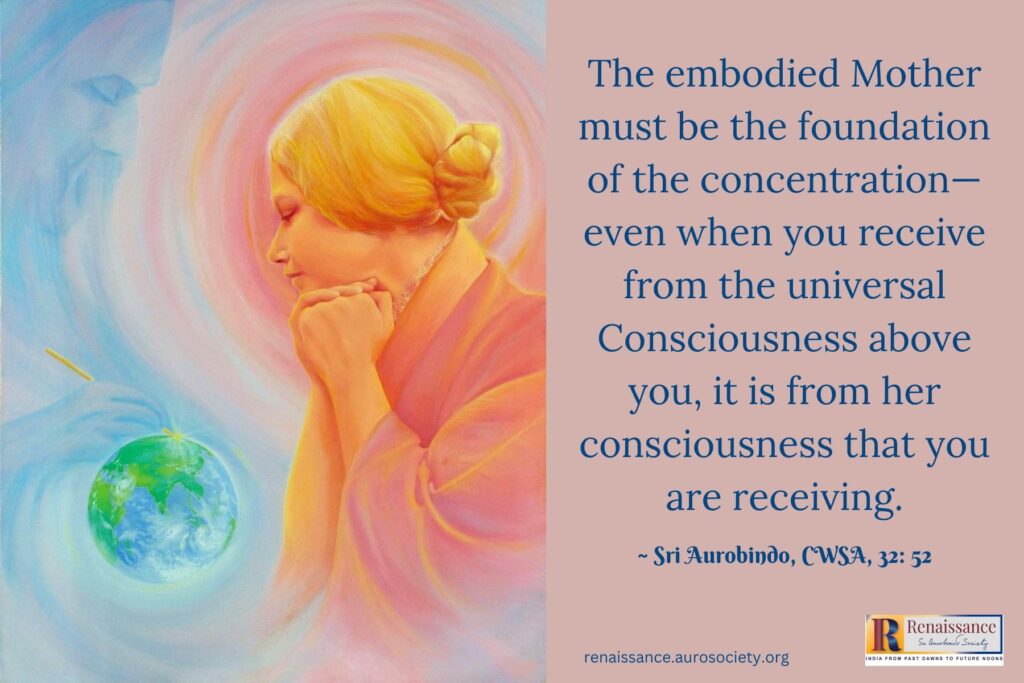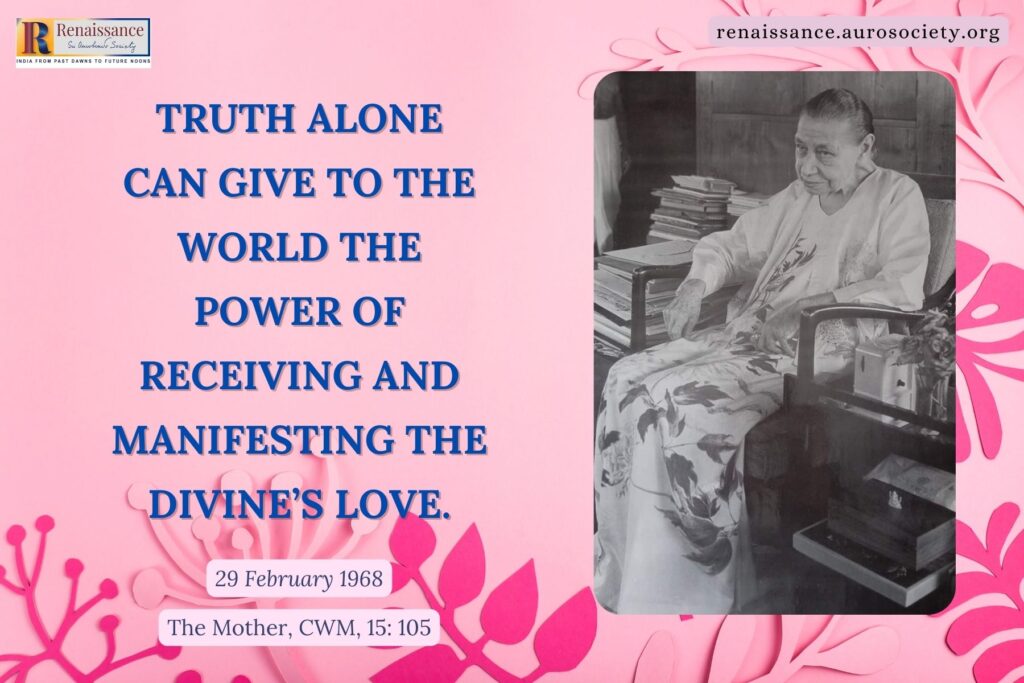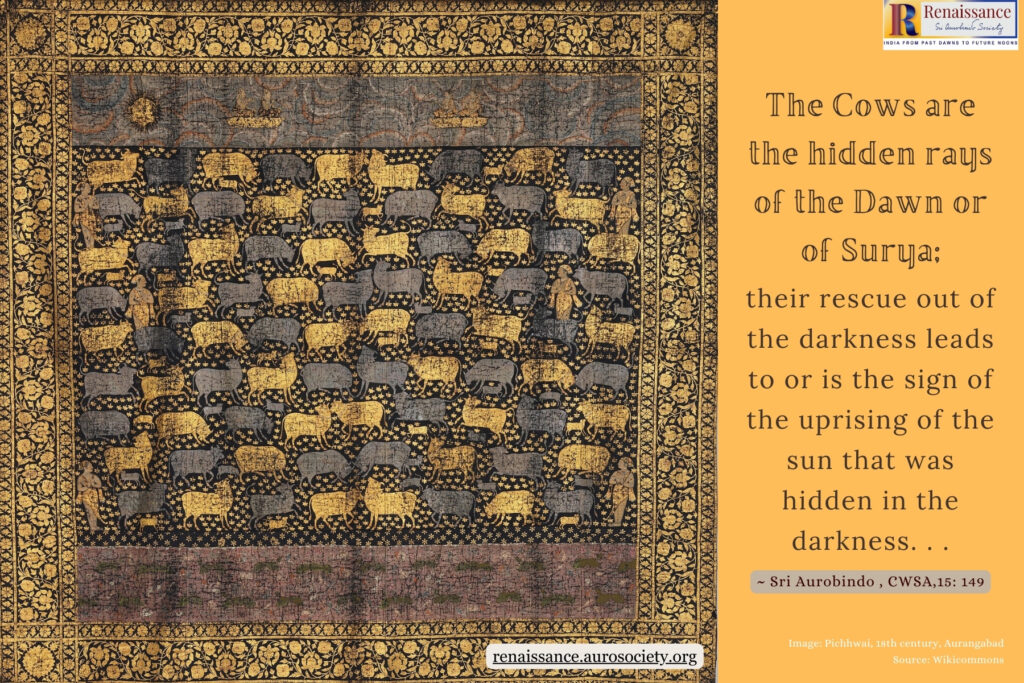Editor’s note: In our Book of the Month, we feature Nirodbaran’s book titled Twelve Years with Sri Aurobindo – a book that truly gives us a very personal account of numerous ways in which one may practice Integral Yoga by cultivating an intimate relation with the Divine and serving the Divine. We zoom in on a special excerpt where he describes some delightful aspects of Champaklal’s ‘bhakta’ personality. Reading these excerpts is an entire education in what it means to truly give oneself to the Divine.

I do not know if I have the right to speak of my other colleagues, but of Champaklal particularly I must write a few heart-felt words, for his spirit of service has left an indelible impression on my soul and taught me what true service is. Let me prelude it with the Mother’s opinion about him when she introduced him to Andre, her son, in 1949. She said with great warmth:
He came here when he was very young. I taught him many kinds of work. He has himself taken up Sri Aurobindo’s personal service. He looks into practically everything with regard to Sri Aurobindo. He is extremely careful, meticulous and very particular about details. He has no regular time for food; he takes it when he can. So it is with his sleep.
That is why he cannot join the sports activities. He works with joy and devotion. He collects all our little things and keeps them with great care — our clothes, nails, hair, etc.
By the very mould of his nature a bhakta, he came into our midst by his innate right, as I have said. Not a bhakta of the traditional type, but one who has chosen service as the means of self-expression and fundamental realisation. Even the word realisation may not be correct, for self-giving alone is what counts with him.
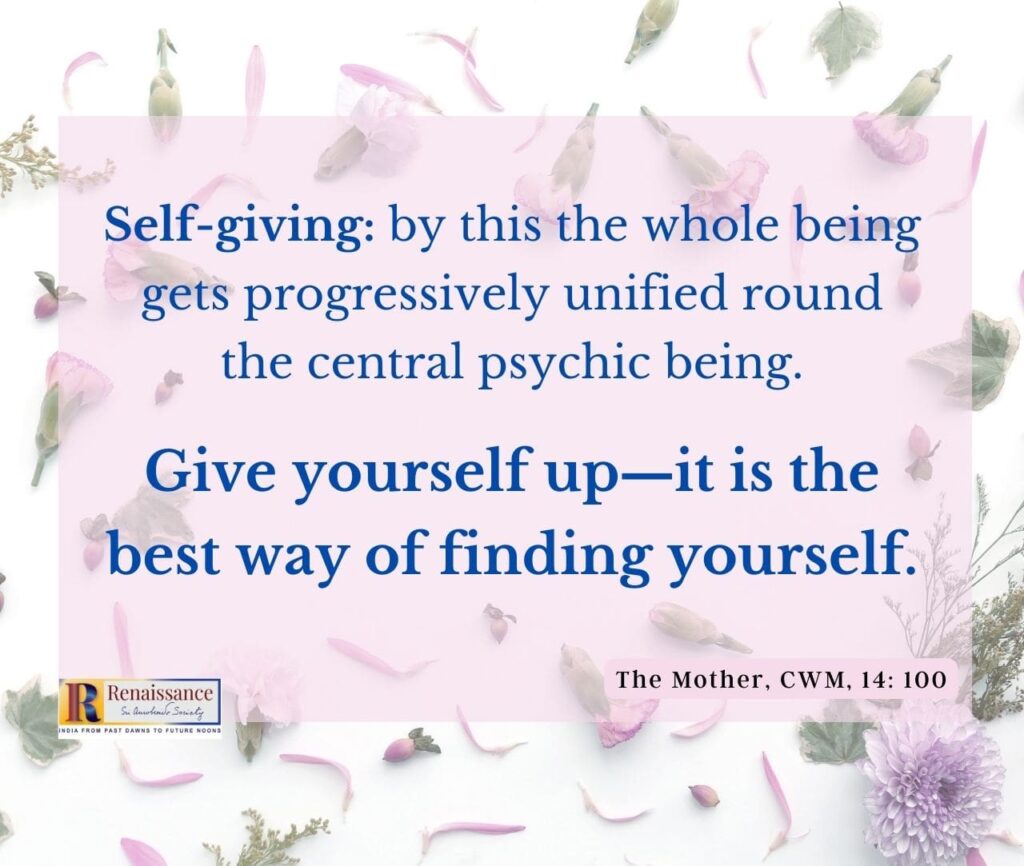
Service is his very food.
If any of us did his part of the job, he would get annoyed and exclaim, “You are depriving me of my food; I can remain without food but not without work.”
That sums up Champaklal and that is exactly the spirit he maintained unflinchingly throughout the long decade that we lived and worked together. The Mother had entire trust in him and putting him in Sri Aurobindo’s service along with us, felt quite at ease.
To be at the Divine’s service is the surest means of attaining realisation.
~ The Mother, CWM, Vol. 14, p. 105
Sri Aurobindo also relied on him for all necessary information regarding the Mother and other particulars. Once the Mother came to Sri Aurobindo’s room and sat as usual on the couch opposite. We were just watching. Sri Aurobindo signed to Champaklal turning his glance towards the Mother. Champaklal understood and jumped up and put some cushions at the Mother’s back. That is their way!
I am firmly convinced that through the ages he has been closely connected with the Mother and Sri Aurobindo, otherwise how could he have been selected as Sri Aurobindo’s personal attendant, even as a young man, as soon as he arrived?
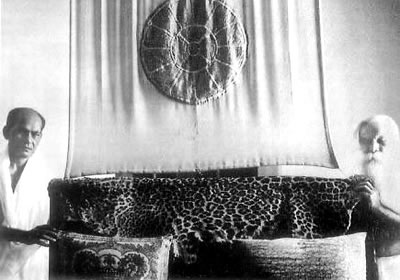
When he came to see Sri Aurobindo for the first time, he lay prostrate at his feet for an hour, all bathed in happy tears! And when he was leaving, Sri Aurobindo asked one of his older companions to bring him back with him!
It is he who first accepted Sri Aurobindo as the Divine Father and called him Father, accepted the Mother as the Divine Mother and began to call her Mother.
When he offered to wash the ‘Father’s’ clothes, Sri Aurobindo warned him that he would be mocked at, but that did not deter him. He had gone without food and sleep, had not moved from his place lest the Master should need something or should even have to wait a minute more.
To serve Sri Aurobindo was in one way quite easy, for he would never make any demands on us, was content with the main necessities being met and would never express any displeasure if we failed him. This very easiness kept us alert, for one who didn’t ask for more than the bare minimum, needed a careful, vigilant watch so that he could be given a little more comfort and ease.
Champaklal kept that vigilant eye always. He was more familiar with Sri Aurobindo’s nature and temperament by love and long experience and felt his needs on his very pulse. If he saw that Sri Aurobindo needed some side pillows, he got them made; if his footstool was a bit high or low, he adjusted it to the required height. He put a time-piece by his side, for he knew that Sri Aurobindo was in the habit of frequently seeing the time.
Such small things that would pass unnoticed because our imaginative perception was perhaps dull, were caught by his sensitive insight and he tried to make “happy and comfortable” the life of the impersonal Brahman.
Sri Aurobindo, when he sat on the edge of the bed and had to wait long for the Mother’s arrival, seemed to feel drowsy; his body would lean backwards and would then right itself. Still, he would not ask for any assistance — but this, not from any sense of egoism. He would put up with any inconvenience but if we offered him some help, he did not refuse it. We simply looked on without knowing how to meet the situation, but Champaklal rose to the occasion: he made a pile of pillows to serve as his back-rest and to prevent them from tumbling down, supported them from behind.
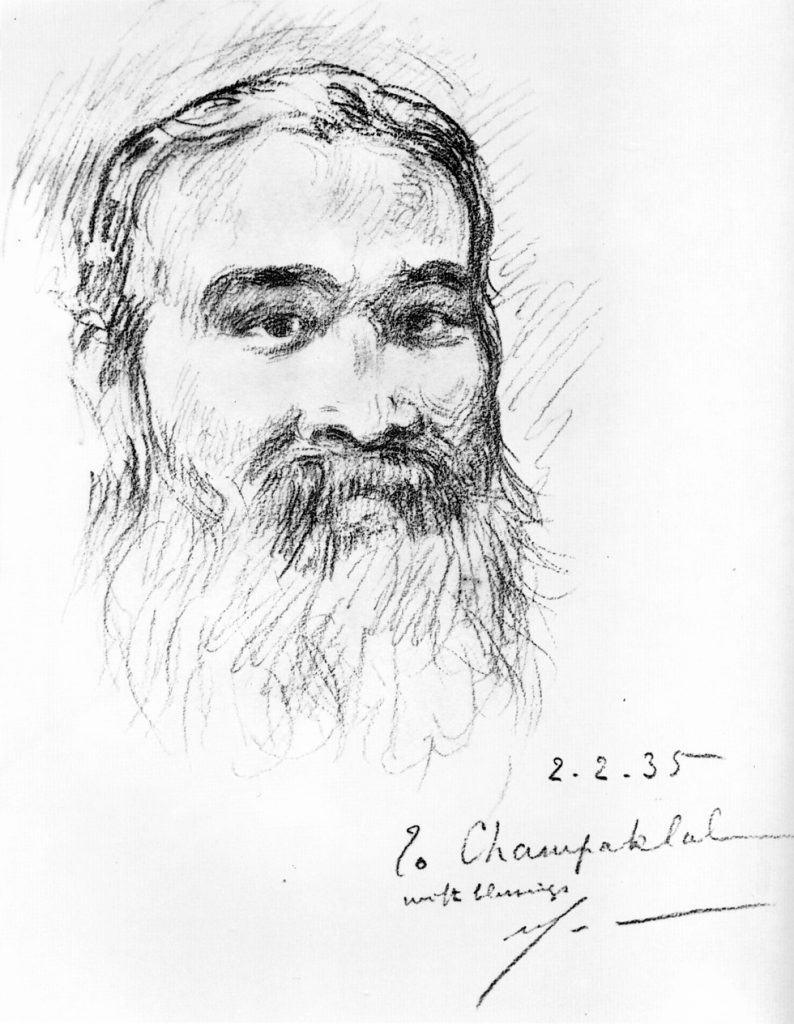
To observe economy due to the War, the Mother advised us not to change Sri Aurobindo’s bed-sheets too often. But if there was a tiny stain on an otherwise clean white sheet, Champaklal would hesitate to use it, saying, “How can we use anything unclean for the Lord?”
I sometimes got my share of rebuke from him if I was not tidy or clean enough: “You are a doctor and you still don’t wash your hands?” he would say. The fact in his case was that over and above his own training he belonged to a very orthodox Brahmin family and had meticulously observed all the practices ordained by the Shastras and enjoined upon the children by his orthodox priest-father. We were quite modern people having our own ideas of things, so sometimes clash and conflict would arise.
Besides, he was in some parts sensitive like a child. We had to be very careful not to upset him and to spare his feelings as much as we could.
He could not understand jokes or any round-about manner. He told me that Sri Aurobindo had once spoken about this to the Mother. It was just after he had settled here. His father wrote a letter to Sri Aurobindo saying that Champaklal’s marriage had been fixed; he had only to go, undergo the marriage ceremony and then come back. Sri Aurobindo gravely said, “I suppose we have to send back Champaklal.” He was much perturbed to hear it. Then Sri Aurobindo added, “He doesn’t understand jokes.”
He knew, however, how to get things done by the Divine, — blessings written on a book, for instance, an autograph on a photo. If asked by Champaklal, Sri Aurobindo would not refuse. The Mother too has to accede to the wishes of her bhakta, her “most faithful child”.
One day he conceived the idea of getting Sri Aurobindo’s footprints; but how was he to do it without troubling him in any way or without informing him in advance? He had a brain-wave. He kept a white sheet of paper and pencil ready. As soon as Sri Aurobindo sat on the chair, he pushed the sheet of paper under his feet and asked, “May I draw your footprint?” Sri Aurobindo not only consented but later wrote “Love and Blessings” on the drawing.
Let us not forget, by the way, that Champaklal is an artist.
Whenever he saw Sri Aurobindo in what seemed to him statuesque poses his heart would go into rapture and he would call us to share his joy. He would exclaim, “Ah, if a photograph could be taken of this marvellous pose!”
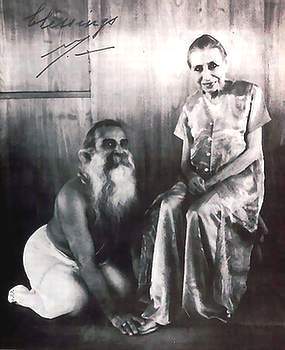
The Mother has said that he has “a natural talent already developed to an unusual degree”.
On one of his birthdays he painted two lotuses, white and red, and offered the pictures to the Mother. She was very pleased and said she would take them to Sri Aurobindo and ask him to write something. He wrote under the painting of the white lotus: Aditi, The Divine Mother. And the Mother wrote on the other: The Avatar. But she forbade Champaklal to show them to anyone, for people would not understand what they meant.
Champaklal is the custodian of all their relics such as hair, nails and teeth. He has even stored up all the ashes of the burnt mosquito-coils.
Here is a humorous incident in connection with the ashes. Once during our evening talks, the Mother came in with a telegram asking Sri Aurobindo to send “ashes” for someone’s marriage. We were perplexed for we could not make out the meaning. Purani had an intuitive flash and said, “It may be the Indian word āsīs for benediction.”
“Oh, I see!” exclaimed Sri Aurobindo, “I was wondering how I was supposed to carry ashes with me, perhaps on my head! Of course I can give them some from Champaklal’s mosquito-coils. If I had not given up smoking, I could have given some cigar-ash.”
Also read:
Religion, Yoga of Bhakti and the Conception of the Divine
~ Design: Beloo Mehra

